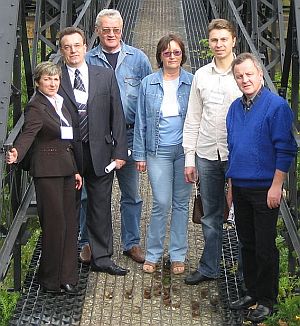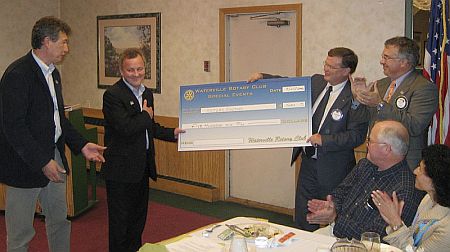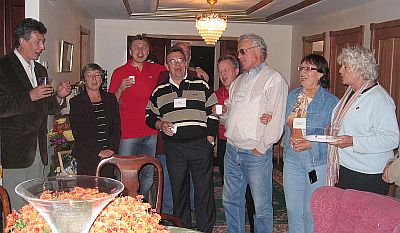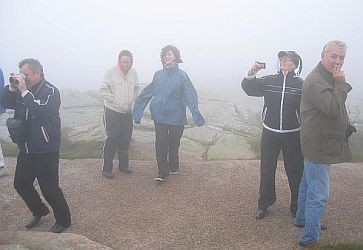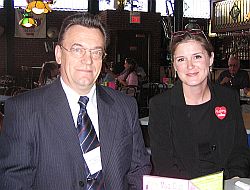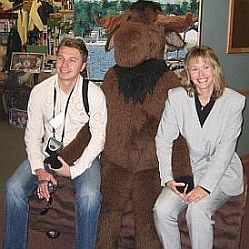 |
Kotlas - Waterville Area Sister City Connection P.O. Box 1747 Waterville, ME 04903-1747 Write to Us |
 |
Home > Projects > Medical Delegation (2006)
| In this issue: |
|
* * * Click on any blue-bordered photo to enlarge it. * * * Medical Delegation Comes to WatervilleEarly on the morning of Friday, September 22, four doctors and a nurse arrived in Waterville from Kotlas. Along with that city's deputy mayor, they composed the Kotlas Connection's first-ever medical delegation. Our guests were here for ten days, departing on Monday, October 2. The visit enabled them to meet American counterparts and exchange ideas on medical care. Our invitees were:
Each member of the delegation was hosted by a local family: Dr. Sukhanov by Sheila McCarthy and her husband Cliff Reid of Waterville; the Mezentsevs by retired nephrologist John Engle and his wife, Ruth, also of Waterville; Dr. Koltovaya by South China residents Ellen and Richard Corey; and Dr. Menshakov by retired anesthesiologist Ken Green and his wife Eva of Waterville. Finally, Andrei Bralnin stayed with Waterville Mayor Paul LePage and his wife Ann. The medical exchange would not have been possible without the efforts of John Engle, who conceived the project, and the generous donations from MaineGeneral Medical Center ($5,000), Inland Hospital ($5,000), Waterville Rotary ($2,500), and the Bourque-Lanigan Post 5 of the American Legion ($200). (During the visit, the Rotary Club made an additional donation of $500 directly to the Kotlas Central City Hospital.) We also thank Sheila McCarthy and the Russian Department at Colby College for their translation assistance. Our guests had a full itinerary during their stay. Besides meeting their peers and touring local medical facilities, they took day trips to Acadia National Park and Boston, enjoyed a picnic at a lakeside camp and a dinner at the Waterville Country Club, had a downtown walking tour organized by the Mid-Maine Chamber of Commerce and Waterville Main Street, attended a meeting of the Waterville Rotary Club, and answered questions about medical care in Russia at a public reception. The highlights of their schedule are listed below:
A Foggy Day on Cadillac Mountain
By Carl Daiker One of the more memorable parts of the medical delegation's visit was the bus trip to Acadia National Park on Sunday, September 24. It was a dull, overcast day with a constant threat of rain. One of the highlights of the day was to be the view from the top of Cadillac Mountain, but the mountain was socked in by fog. The bus driver had to maneuver carefully up the winding access road to the summit. At the top, one could not see more than 20 feet in any direction and the wind was gusting to probably 40 miles per hour. The visiting Russians took pictures just to illustrate for friends back home the conditions on the mountain that day. In this photo by the Kotlas Connection's Jack Mayhew, Sergei Sukhanov (left) and Tatiana Mezentseva (second from right) take picutures of the fog, while Vladimir Mezentsev warms himself with a cigarette. The two women in the middle are associated with Colby College: an exchange student from Belarus (left) and this year's Russia language assistant from St. Petersburg. The rain and wind did not prevent at least one of the delegation from taking a short dip in the ocean during the stop at Sand Beach. Later in the afternoon those on the trip enjoyed tea and popovers at the Jordan Pond House. Profiles of Our GuestsBy Gregor Smith The head of the delegation, Sergei Sukhanov, graduated from medical school 28 years ago. He has spent 16 years as a practicing physician and 12 years in hospital administration. He has two grown children: a son who works as an economist and a daughter who teaches Russian and literature. He also has a four-year-old son. Alexander Menshakov graduated from medical school in 1979 and was a surgeon for 20 years. In 1992, he and two other doctors started a private diagnostic clinic, the only one of its kind in the Archangel Region. He has a grown daughter, who is also a doctor, and a three-year-old granddaughter. He also has a son who is still in school, but plans to become an economist. Vladimir Mezentsev has been an orthopedic surgeon since 1978 and is a graduate of the Yaroslavl Medical School. He is a native of Kotlas who returned to that city in 1982. He is married, with two children and three grandchildren. Update: Vladimir Mezentsev passed away in June 2007. A smoker, Dr. Mezentsev succumbed to lung cancer. Next year, Tatiana Mezentseva will mark her fortieth year as a surgical nurse in the Kotlas Central City Hospital. She has been a senior nurse for 20 years. Yelena Koltovaya graduated from Archangel Medical School in 1985. She has been a pediatrician for 20 years, the last eight as a pediatric cardiologist. She is now the assistant chief doctor for pediatric services at the Kotlas Central City Hospital. She is married and has sons, one in his early 20's and the other in his teens. Finally, Andrei Bralnin, is deputy mayor of Kotlas and heads that city's Department of Economic Development. A generation younger than the other members of the delegation, Bralnin is a graduate of the Kiev Aviation Institute. He worked four years in a bank and then five years in city administration. The only member of the delegation to speak any English, Bralnin is also the only one to have previously visited Waterville, in August 2004. Kotlas Doctors Attend Public Reception,
|
 Andrei Bralnin presents a painting to Waterville Mayor Paul LePage of the former ferry terminal at Kotlas. As Kotlas no longer has scheduled ferry service, the river station has since been turned into a mini-mall. Click on the painting to enlarge it. The name of the artist is not known. Photo by Gregor Smith. |
By Gregor Smith
"I am very happy to be here on Waterville soil," said Dr. Sergei Sukanov. "When we greeted the American delegation on August 6, 2005, I didn't think that I would be here in Waterville. For us it is a very meaningful visit. We are looking for a continuation of human and professional contacts."
In his remarks, Dr. Sukhanov was referring to a visit by a Waterville delegation to the Kotlas Central City Hospital, of which he is chief physician. He was addressing some three dozen Waterville area residents at a public reception on September 27, 2006, in the REM Forum at The Center on Main Street in Waterville.
Dr. Alexander Menshakov, also found the present visit very useful. "This visit is extremely valuable to me," he stated, "because I think that the American system of health care will eventually be adopted in the Russia Federation." Dr. Menshakov was formerly a colorectal surgeon at the Kotlas hospital but has since co-founded a private diagnostic clinic.
The two physicians, along with orthopedic surgeon Vladimir Mezentsev, surgical nurse Tatiana Mezentseva, pediatric cardiologist Yelena Koltovaya, and Kotlas deputy mayor Andrei Bralnin, composed the first ever medical delegation from Kotlas. The Wednesday evening reception fell in the middle of their ten-day visit to Waterville.
After a social time with punch, coffee, and dessert, Andrei Bralnin presented laminated copies in English and Russian of a formal letter from his boss, Segei Melentev. Addressed to Waterville Mayor Paul LePage, the letter read, in part, "Accept my appreciation for the invitation of our delegation of doctors to visit your town, Waterville. We extend our friendship to all of you. [We] hope that our communicating, discussions, and exchange projects in culture, education and medicine is a real sign of our long cooperation and peaceful trust of each other." Melentev closed with an invitation to LePage to lead a delegation to Kotlas next June to participate in that city's ninetieth anniversary celebrations.
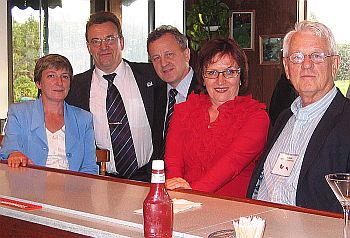 Yelena Koltovaya, Alexander Menshakov, Sergei Sukhanov, Tatiana Mezentseva, and Ken Green at the Waterville Country Club. Photo by Jack Mayhew. |
The members of the delegation then introduced themselves, speaking about their families and professional backgrounds. They shared their impressions of the visit and took questions about health care in Russia.
Dr. Sukhanov gave some statitics about the hospital he heads. The Kotlas Central City Hospital has 600 beds and 1600 staff, including 200 doctors. (To put these numbers in perspective, consider that taken together, Waterville's three hospital campuses have just over 200 beds.) Some 200,000 people live in the area served by the hospital, including 73,000 in Kotlas itself. That area also contains eight or nine other smaller hospitals and numerous village clinics.
Before becoming hospital chief, Dr. Sukhanov was a practicing physician for sixteen years, specializing in stomatology and maxillofacial surgery. He noted that in Russia, every hospital head is a well-experienced physician who is named chief because he also has very good administrative skills. Additional training is offered, beyond medical school, to prepare doctors to become medical administrators. As chief physician, Dr. Sukhanov no longer sees patients himself and "doesn’t have time to miss it."
Alexander Menshakov in turn spoke about his reasons for starting his clinic. "The early 1990's were years of collapse of the medical system in the Russian Federation," he stated. As a surgeon in the Kotlas hospital, he noticed that few patients from remote villages were coming in for treatment. Many rural patients did not own cars and did not have access to public transportation; nor could they pay for private transportation to the hospital in Kotlas. Thus, the clinic created "mobile medical teams" that would go to the patients. The clinic was also fortunate to be able to lease equipment from medical schools. "Our center served 90,000 patients last year," he said. The clinic has also built relationships with factories and other enterprises that pay for screenings for their employees.
Ken Green, a retired anesthesiologist, asked how health care was paid for, and whether it was funded in part from the sale of Russia's oil. Sukhanov replied, to guffaws from the audience, "Money doesn't smell, so I don't know is it is oil money."
He explained that all Russians have free medical insurance: "Many budgets are involved: local regional, and federal." Further, every employer sets aside money for the medical care of the employees. Students and unemployed people are covered by the government.
Russian insurance providers do not direct what care patients receive or how long they remain in hospital. They look only at the reason for admittance and verify the type of treatment received. A patient never receives a bill for services; it is sent directly to the insurance provider.
Increasingly, Russians are also buying private coverage to supplement their government- or employer-provided insurance. Dr. Sukhanov noted that while private coverage is not yet widespread, it works more efficiently. The privately insured have direct access to the best hospitals in Moscow and other major cities. People without private coverage can also be treated at these facilities, but only if referred by a local hospital.
When the delegates were asked what was the most unusual thing they encountered in America, Andrei Bralnin immediately replied in English, to uproarious laughter from the audience, "No fish in America!" An inveterate fisherman, Bralnin went fishing both in North Pond and off the coast, but was unsuccessful both times. The night before the reception, however, however, executive committee member Jack Mayhew gave him wall-mounted, battery-operated, mechanical singing fish as a gag gift.
Dr. Mezentsev had a more thoughtful response: "I was surprised. I couldn't even comprehend it at first. Why would American doctors, after performing tremendously complicated surgery like hip replacement, release patients after only four days." The reason: "business," because patients, especially the elderly, are sent to other non-medical facilities (e.g. nursing homes), while younger patients are treated at home.
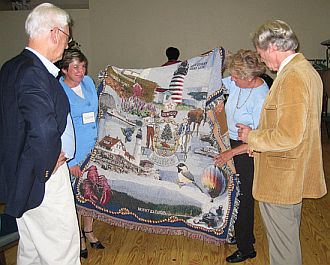 Yelena Koltovaya (left) and Nancy Foster hold one of the three identical Maine throws presented to the delegation. Ken Green (left) and Herb Foster look on. Photo by Jack Mayhew. |
Dr. Sukhanov elaborated: Because the distance between the patient's home and the hospital is often vast, there isn't the opportunity for follow-up care when patients return home, so patients are kept in hospital longer. Hospital stays range from 3-4 days to 1-1˝ months.
Responding to a question about childhood obesity, Yelena Koltovaya, a pediatric cardiologist said, "Our children go to school on foot; we go to work on foot; we do not have the same problem."
At the close of the question and answer session, around 9:00, Kotlas Connection co-chairman Herb Foster presented official gifts from the Kotlas Connection to each of our guests. He gave woven Maine throws to three of our guests. Dr. Mezentseva received a tote bag with a lighthouse stitched on it and Bralnin, who had been given a throw on his previous visit, received a black fleece jacket.
This article includes material from a subsequent private interview by the author with Dr. Sukhanov.
